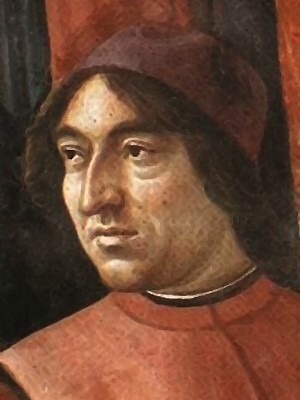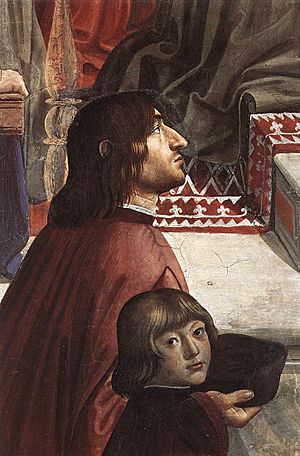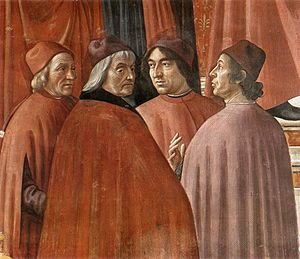Poliziano facts for kids
Quick facts for kids
Angelo Poliziano
|
|
|---|---|

Angelo Poliziano from a fresco painted by Renaissance artist Domenico Ghirlandaio in the Tornabuoni Chapel, Santa Maria Novella, Florence
|
|
| Born |
Angelo Ambrogini
July 14, 1454 Montepulciano
|
| Died | September 24, 1494 (aged 40) Florence, Italy
|
| Cause of death | Poisoning |
| Doctoral advisor | |
| Notable students | Alessandra Scala, Cassandra Fedele, Piero II de' Medici |
|
Influences
|
|

Angelo Ambrogini (born July 14, 1454 – died September 24, 1494), known as Poliziano, was an important Italian scholar and poet. He lived during the Florentine Renaissance, a time of great art and learning in Florence, Italy. His nickname, Poliziano, came from his hometown, Montepulciano.
Poliziano was a "classical scholar." This means he studied the ancient Greek and Roman languages, literature, and history. His work helped change how people used Latin during the Renaissance. He also helped develop philology, which is the study of language in historical texts.
He translated parts of Homer's Iliad and edited poems by Catullus. His deep knowledge of classical texts caught the attention of the powerful Medici family. The Medici family ruled Florence and were big supporters of arts and learning. Poliziano became a tutor for their children and a close friend. He also wrote poems that praised his patrons, like La Giostra.
Contents
Angelo Poliziano's Life Story
Early Years and Education
Angelo Ambrogini, later known as Poliziano, was born in Montepulciano, Tuscany, in 1454. His father, Benedetto, was a lawyer. He was killed by political enemies because he supported Piero di Cosimo de' Medici, a member of the Medici family. This sad event gave young Angelo a connection to the powerful House of Medici.
When he was ten, Poliziano moved to Florence to study. He lived with a cousin and quickly learned Latin and Greek. He also studied philosophy with Marsilio Ficino, a famous thinker. By age 13, he was writing Latin letters. At 17, he wrote Greek poems, and at 18, he published an edition of poems by Catullus.
In 1470, he translated parts of Homer's Iliad into Latin. This earned him the title "homericus adulescens," meaning "Homeric youth." Lorenzo de' Medici, the ruler of Florence and a major supporter of learning, invited Poliziano to live in his home. Poliziano became the tutor for Lorenzo's children, including Piero the Unfortunate and Giovanni, who later became Pope Leo X. Poliziano's modern teaching style sometimes caused disagreements with their mother, Clarice Orsini. Lorenzo also helped him get an important job at the University of Florence.
Teaching and Influence

Poliziano became a very popular teacher. Students from all over Europe, including Germany, England, and Portugal, came to learn from him. These students later took Italian culture and knowledge back to their own countries.
Professors in Poliziano's time would read ancient Greek and Latin books with their students. They would explain difficult parts, correct mistakes in the texts, and teach about the laws, customs, and ideas of the ancient world. Poliziano taught about almost all classical literature. He published notes from his lessons on writers like Ovid, Suetonius, and Pliny the Younger. He also worked on a new version of the Roman law book called Digest. His work on this book influenced later Roman law.
Final Years and Passing
[[File:Style of Niccolò Fiorentino, Angelo Poliziano, 1454-1494, Humanist (obverse), c. 1494, medallion in the National Gallery of Art]] Poliziano lived comfortably in his final years, focusing on his studies. His friend and patron, Lorenzo de' Medici, passed away in April 1492. Poliziano himself died on September 24, 1494.
In 2007, scientists studied the remains of Poliziano and another scholar, Pico della Mirandola. They found that both likely died from arsenic poisoning. This may have been ordered by Lorenzo's son, Piero de' Medici.
Poliziano's Lasting Impact
Poliziano was famous as a scholar, professor, and Latin poet. He lived at a time when people deeply admired and studied ancient texts. He represented an age where scholars looked to ancient history for ideas about how to live. He was also known as an Italian poet, living at the same time as Ariosto, another great writer.
He also worked as a translator, bringing Greek works into Latin. One of his most important works was a collection of essays on language and criticism called Miscellanea, published in 1489. These essays had a big and lasting effect, influencing scholars for the next century.
Key Works by Poliziano
His works in Latin and Greek include:
- Manto: A poem praising the Roman poet Virgil.
- Ambra: A poem describing the beautiful countryside of Tuscany and praising Homer.
- Rusticus: A poem celebrating life in the countryside.
- Nutricia: A work meant to introduce people to the study of ancient and modern poetry.
His main works in Italian are:
- Stanze per la giostra (also known as La Giostra): This is considered his best Italian work. He wrote it after Giuliano di Piero de' Medici won a tournament in 1475. The poem was never finished because Giuliano was killed in the Pazzi conspiracy in 1478.
- Orfeo: A play with songs that was performed with music in Mantua.
- A collection of Tuscan songs: These poems were inspired by popular folk songs and were known for their beautiful, flowing style.
His philosophical works include:
- Praelectio de dialectica (1491): An introduction to the ideas of Aristotle about logic.
- Lamia. Praelectio in Priora Aristotelis Analytica (1492).
- Dialectica (1493): Another introduction to Aristotelian philosophy.
See also
 In Spanish: Angelo Poliziano para niños
In Spanish: Angelo Poliziano para niños

